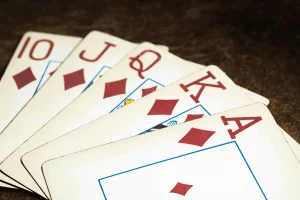Hit and Run Poker
In poker, players use many strategies and approaches in an effort to maximize their winnings and minimize their losses. Among these myriad strategies is a controversial tactic known as “hit and run”. From my own experience and observations, I have come to understand the nuances of this approach, its implications, and the controversy it often causes in the poker community.

The term “hit-and-run” refers to the practice of participating in a poker game, winning a significant pot or series of banks in a relatively short period of time, and then immediately exiting the game. This strategy is not a violation of official poker rules or casino regulations. Technically, players can leave the game at will, taking their winnings with them. However, the ethical implications of hit and run tactics can lead to tension and conflict at the table.
The use of a hit and run strategy is often seen as a breach of poker etiquette, as it denies opponents the opportunity to win back. Poker, at its core, is not just a game of cards and betting; it is a social interaction built on rules of behavior and mutual respect between players. The sociable aspect of poker implies a tacit agreement to engage in constant competition, allowing for the ebb and flow of luck. Abruptly quitting after a significant win disrupts this dynamic, leaving a bad feeling for those left behind.
The feeling of rudeness associated with hit-and-run comes from the fact that it abruptly interrupts the natural rhythm of the game. Players invest not only their money, but also their time and skill, anticipating a session of competitive play. When a person leaves the game immediately after winning, it can feel like they have taken advantage of the social contract of the game for personal gain without giving others the opportunity to win their chips back. This can cause resentment and disrupt the atmosphere of collectivism.
Why Hit and Run in Poker is Unacceptable
On my personal gaming experience, I have seen that the tactic of “hit and run” can upset the balance in the game, namely that everyone plays on equal terms and pursue two goals, it is to enjoy the game and win money, but I have many times met people who took half of the chips from the game table and then leave the game. Although this is not technically against the rules, leaving the game abruptly after a big win deprives other players of the opportunity to win back. This not only spoils the atmosphere, but also violates the unspoken rules of mutual respect between opponents.
Moreover, the effects of a hit-and-run can spread throughout the poker room, significantly affecting the dynamics of the game. The sudden removal of a large portion of chips from the table can dampen the competitive spirit, leaving players with fewer resources to fight with, which can lead to a domino effect when the game breaks down and players disperse. This can turn a lively table into a desolate landscape, limiting the rich competitive experience players seek.
Upon reflection, although I have encountered moments where the temptation of a quick win has occurred, I realized that I appreciate the deeper, more satisfying aspects of poker. It’s a game that rewards not only flair, but honesty, respect, and a commitment to the competitive spirit. By fully participating in the ebbs and flows of the game, respecting the community aspect of poker and honoring the competitive spirit that defines it, we uphold the very essence of what makes poker not just a game, but a profound human experience.
How Casinos are Struggling With Hit and Run
Over the years of playing in poker rooms, I have seen firsthand the impact of the “hit and run” tactic on the casino environment. While players may use this strategy for short-term gains, it is important to realize that its impact extends beyond the poker table, affecting the overall dynamics of the game and the casino’s player base. As someone who is deeply immersed in the world of poker, I have observed the measures casinos are taking to mitigate the devastating impact of the hit and run game, ensuring an exciting game for all participants.

Recognizing that the hit and run strategy can interfere with consistent play and reduce player numbers, casinos have developed specific countermeasures. One such method is the introduction of a withdrawal waiting period for players using this tactic. By increasing the time in which withdrawals are considered, casinos effectively deter players from quickly cashing out and leaving. This delay not only discourages the use of hit-and-run tactics, but also subtly hints players to reconsider their decision to withdraw, which may attract them back into the game.
In addition, casinos have policies regarding re-entry and buy-in levels after a cash-out. Players who choose to hit-and-run and subsequently want to cash out their chips to make a quick exit face certain restrictions upon their return. Specifically, if they choose to resume play, they often have to participate in games with higher buy-ins than the amount they previously cashed in. This rule serves a dual purpose; it discourages immediate withdrawal of winnings in pursuit of “hit and run” tactics and encourages more engaged, long-term participation in higher stakes games.
These measures, while they may seem punitive, are designed with the integrity of the game and the poker community in mind. They aim to preserve the competitive spirit and social dynamics that make poker a deeply engaging and rewarding endeavor. As a player, I appreciated the need for these policies, realizing that the health and viability of poker rooms depends on mutual respect for the game and its participants.
Conclusion
In my view, the use of the hit and run strategy undermines the principles underlying the game of poker. It disrupts the competitive balance and detracts from the mutual respect and challenge that is at the heart of poker. Such tactics, while not against the rules, violate the players’ unwritten code of honor – the obligation to engage in fair and sustained competition that allows for the natural ebb and flow of gameplay. Such an approach disregards the competitive nature of the game, focusing on immediate gain at the expense of the broader and enriching experience that poker offers.
As a player committed to the integrity and spirit of poker, I strongly discourage resorting to “hit and run” tactics. This means that short-term advantages are more important than enduring values such as respect, challenge and development. Poker, at its core, is not just about winning money. It’s about testing your skills against your opponents, learning from every hand, and contributing to a dynamic, competitive environment that enriches all participants.

